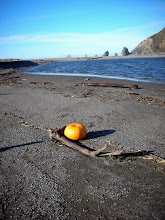
Friday, 3pm
It's one of those monochrome afternoons where everything appears as if in an old black and white movie. The dark slate sand set against the steely gray sea underneath a patchwork overcast sky. The horizon doesn't exist between the silvery water and flat and somber clouds. Only the dark shadow of Reading Rock marks the boundary between ocean and sky.
The only hint of color appears in isolated blades of beach grass and the translucent jade in that final line of breaking waves on the shore. Even the redwoods on faraway hillsides appear black on this hazy, late afternoon.
The receding tide is already far out though the official low tide doesn't arrive for another three hours. The beach is wide and long with a steep downhill run to the water. A line of dark boulders marks an almost walkable path out the the Sister Rocks. The Sisters and Little Girl Rock stand taller than usual in the shrinking ocean.
Gray and white gulls, Westerns mostly with a few Californians sifted among them, gather on the north side of the creek. Eight mergansers paddle in the calm backwater outside the mainstem of the cascading creek; One male swims calmly with four females, while three other males hang out and fish nearby. I wonder briefly who are the lucky ones.
A pile of blubbery harbor seals laze on the inside of the spit - silver, spotted, charcoal and vanilla - all shades lie together, unconcerned for the most part. As I stroll by, two scouts slip in the cold creek and monitor my progress past their tribe. The rest crane their thick necks and casually watch me through gentle black eyes.
Dark clouds slowly drift in over the hills from the southeast.
Low tide reveals Redwood Creek's deep channel into the Pacific. Rapids tumble over boulders usually hidden by high tides, or even higher low tides, and cascade a hundred yards out in to the ocean.
Walks on this beach tend to draw me inward, into deep thoughts about time, purpose, what I want to be when I grow up, or what I should have been by now and why I'm not there yet. These thoughts can be consuming, and for far too long I've been consumed by them.
A few days ago, I decided to let those kinds of thoughts disappear for a while, to focus on the here and now, the present and not tomorrow. Somewhere, and I forget where, I read, happiness comes when it's not pursued. It's been a pretty good week since I made that small commitment.
The rain begins to spit as I drift off into these deeper thoughts. Thank you, gray skies. The now of staying dry overwhelms my contemplative nature as I head back to my dry car.








